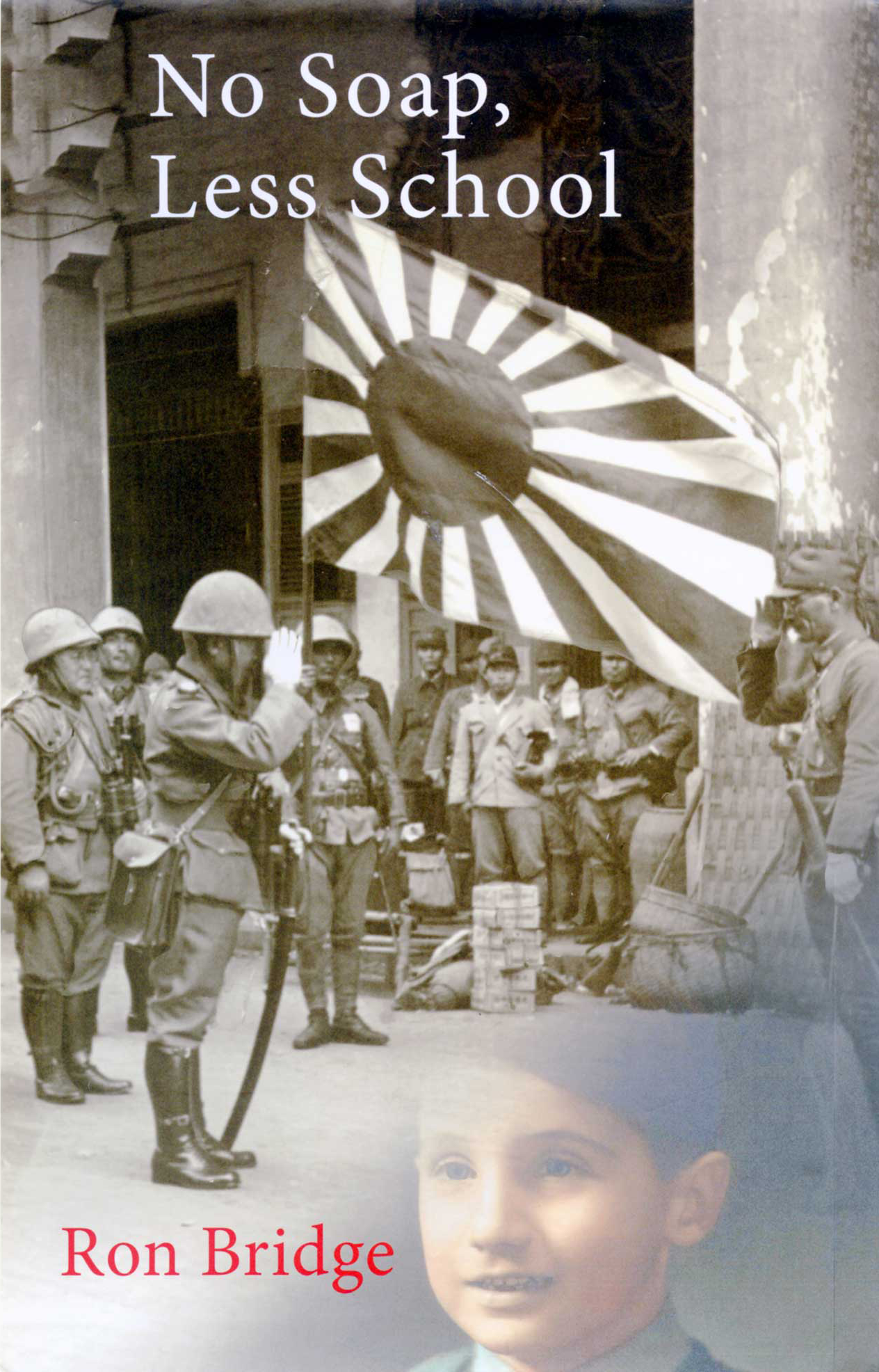
- by Ron Bridge
[Excerpts]
...
 0n the morning of 17`h August I was down by the Church when the drone of an aircraft could be heard.
0n the morning of 17`h August I was down by the Church when the drone of an aircraft could be heard.
A lot of people rushed out of No. 1 Kitchen and streamed towards the sports field. Suddenly a large American aircraft appeared from the sky and began to circle the camp.
With each circuit it came lower, and out of the rear dropped seven parachutists.
From the churchyard we were the nearest, so we ran down the sloping road and out of the gate, turned left and along the road to the end of the camp wall.
The guards made no attempt to stop us.
The Americans landed in a field of kaoliang, and one had damaged his shoulder falling on a grave mound. As we approached, the paratroopers emerged from the six-foot-high kaoliang with guns at waist height.
On slipping out of their parachute harnesses they had put their fingers on the triggers of their carbines. When they realised that they were being approached by schoolboys, women crying with joy, and gangly thin men they relaxed.
Explanations followed and they said that they had been briefed that the landing could have been opposed by the Japanese.
It may well have been so, but the fact that the inmates rushed the gates without fear had not been a scenario anticipated by the guards. So they had just opened up the camp.
One of my friends grabbed at a parachute and we passed the silk around. `Let’s cut it up and each have a piece,’ Peter said quickly. `We could ask the soldiers to sign it,’ I suggested eagerly, grabbing a piece of parachute silk, for to have autographs would be really exciting and a great coup.
Anybody got a knife?’
One appeared and the panels of the parachute were soon mutilated, and our heroes asked to sign before they disappeared into the camp.
`Please sign your name,’ I asked the first officer I came to, held up my piece of parachute silk and he produced a stubby pencil.
My friends were all doing the same thing.
The good-natured soldiers obliged us, probably flattered to be asked and relieved to have such a happy friendly welcome instead of the hostile reception they had expected.
`Now don’t you go tearing up any more of the parachutes, guys,’ Major Staiger said as he scrawled his name on my piece of silk. `One ruined chute is enough.’
Yes sir,’ we breathed as we trooped after them, mingling with the crowds. Not only did I get all seven signatures but acquired the pencil as well!
While this was going on the aircraft continued to circle, but now with its bomb doors open, dropping grey cylindrical containers, each with one parachute in a variety of colours.
There had been one or two dropped with the parachutists, which they had immediately opened, and contained carbines and arms.
Now things were more relaxed we were asked to find the containers, as falling among the kaoliang they were easily hidden. It was really impressive how far the aircraft and soldiers had come, having taken off at five a.m. from Kunming, which was near the Burma border, with a refuelling stop at Xian at eight.
They reached Weihsien at eleven a.m.
Ted McClaren took the Americans towards the camp entrance; here they met the Committee members and had an informal conference as they walked, when Major Staiger explained that his mission was a humanitarian one, to take care of the health and welfare of the internees.
He had only seven men and taking over the full responsibilities of the camp was out of the question.
He valued the Committee’s thoughts.
Then it was through the gates to accept the surrender of the Commandant in his office near the guardroom, where the Japanese guards were cowering.
Major Staiger stated that his `Duck’ team (all relief teams had code names) would administer the camp with the camp’s Committee of Nine.
Defence of the camp from the surrounding guerrillas would rest with the Japanese, as would the provision of food and fuel. The Japanese officials appeared confused by the situation, because such a scenario had not been envisaged by the Japanese planners. The local commanders felt themselves unable to make a binding decision but agreed to accept the directives `temporarily’.
Mr Izu, the Commandant, kept asking what would have happened if the Duck Mission had failed.
He got a stock answer: in that case a second much larger team would have been sent and that would certainly not have failed. Izu then seemed to accept that the Americans were here to stay, and though the subsequent conferences with the Japanese authorities may have been dilatory they were never openly hostile.
Major Staiger mentioned that, as his men would be staying in the camp, the only suitable buildings were the Japanese Headquarters, so the Americans took these over while the Japanese officials returned to their living quarters.
Cpl Orlich set up his radio equipment and suddenly we were in communication with the world.
During the early afternoon, Mr Koga, Vice-Consul at Qingdao, who happened to be in Weihsien when the Duck Team landed, called in, and the whole purpose and authority of the Duck Team had to be explained again.
The agreement of the morning was re-negotiated, Mr Izu pushing for the Americans to take full control, but this was not agreed.
The Committee had recruited a number of men to form a camp police force, if necessary; Dad was one, so he swapped stoking fires and went on roistered guard duties at the gate. We still got hot food from the kitchen, so I suspected that someone else was now a stoker.
[further reading] ...http://www.weihsien-paintings.org/books/NoSoapLessSchool/book(pages)WEB.pdf
#








